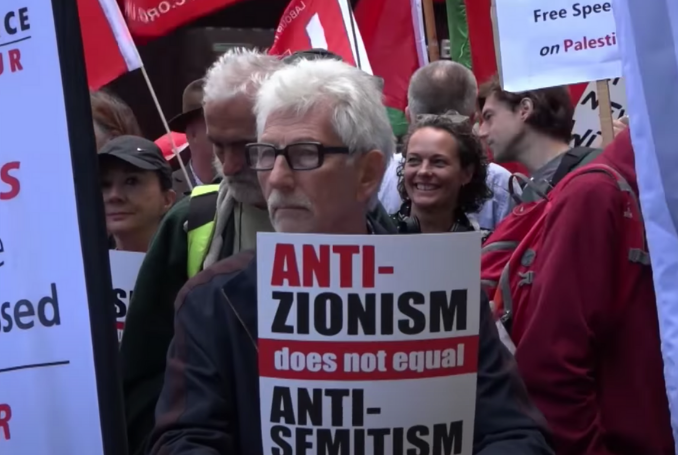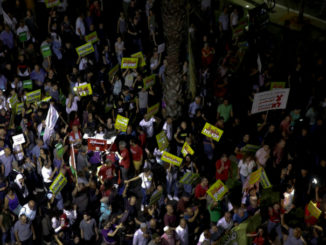
By Jamal Kanj
Imagine in post-apartheid South Africa if blacks practiced racism against whites, and then African American rights groups defended those policies under the pretext of slavery and past oppression of Africans.
There’s no need to imagine, that is exactly what major Jewish rights organizations, such as the Anti -Defamation League (ADL) had done to normalize Israel’s depopulation of Palestine since 1948, and continue to defend Israel’s apartheid practices against Palestinians, today. Not because of Jewish historical grievances against Palestinians, Arabs, or Muslims, but rather for the maltreatment of Jews in Europe.
To ensure the hegemony of the Zionist narratives, ADL, American Jewish Committee, Jewish Congress, AIPAC, etc., used the antisemitism label as an intellectual terror tool to silence critics of Israel equating them with Jewish haters. To the point where Jewish rights organizations’ adherence to the political Zionist project, Israel, is evident in their willingness to whitewash anti-Jewish tropes so long as the Jewish hater is inexplicably a friend of Israel. Conversely, they’d eagerly defile proven anti-racist civil rights pundits, including Jews, and international rights organizations if they dare to challenge Israeli policies.
The term, anti-Jewish hatred, is applied here instead of the sweeping antisemite political label so as not to clump Jewish haters with well-established Israeli and international rights groups such as Amnesty International, Human Rights Watch, B’Tselem, …etc. This is particularly important when supposed Jewish rights organizations purposefully convolute Jewish hate with fact-based political criticism of Israel.
Furthermore, the term Semite is often misused when ascribed to Jews with no proven genetic connections to the original Semites of Mesopotamia, and with an implicit racist intent to exclude non-Jewish Semitic people.
I’m cognizant of the sensitivity when comparing political Zionism to supremacist groups like the Nazis. However, as a Palestinian victim of the Zionist political project, who grew up in a refugee camp, and the son of parents who were refused the right of return to their own homes, simply because they were not Jewish, I understand the ills of dehumanization just like European Jews who suffered under the Nazi program.
To contextualize my proposition, I watched with disgust the appointment of the Jewish racist, Bezalel Smotrich, as a minister in the current Israeli government. The Ukrainian Jewish descendant once addressed a native Palestinian (Israeli) lawmaker stating: “You’re here by accident because (David) Ben-Gurion didn’t finish the job.”
The “job” the most likely Khazar Jewish convert refers to is Ben-Gurion’s order to forcefully evict my parents, along with 780,000 other Palestinians from their homes in 1948, and razing more than 500 villages to the ground. The Palestinian (Israeli) lawmaker was an offspring of the 150,000 natives who managed to stay under the newly imposed state.
In juxtaposing the quintessential racist nature of the maligned oppressors, I am in no way comparing historical Jewish suffering to Palestinians’ pain. Just as I wouldn’t draw any comparison between the slavery of Africans and the ordeal of Aboriginals in the new world. Rather than competing on the scale of grief and victimhood, it would be more productive for all of us to acknowledge that pain is distinctive, individualistic, and real.
Equally, and in order to draw the appropriate conclusions, those experiences should be introduced within a contemporary context. For example, within roughly 15 years, WWII crimes against Jews were recognized, the new Germany acknowledged the harrowing atrocities of the Nazis, compensated victims or their progeny, and restituted their right to go back to their homes.
In contrast, 75 years later, the people of Palestine continue to endure Israeli apartheid occupation, and the expelled population or their descendants are refused the right of return to their original homes.
According to the International Holocaust Remembrance Alliance (IHRA), when I demand justice for my expelled parents or when I contrast the sins of the Nazi attempts to depopulate Europe of Jews, and the Zionist depopulation of Palestine, IHRA characterizes this as “Anti-Semite.”
ADL, IHRA and others use the “antisemitic” political label as a blanket defense to censor public discourse, more so when they fail to argue facts and deeds regarding indefensible Israeli malevolent policies. For them, Israel is a sacred cow, and unlike other political entities they’d give themselves the right to criticize, Israel is untouchable, and above all, is immune from reproach by a Jew or gentile.
Additionally, they fail to provide empirical evidence that criticizing Israeli policies leads to Jewish hatred, nor is there any validation that revering Israel―the Anglicans and Trump’s veneration are just examples―curbs the rise of hate. To the contrary, there are reasons to believe that observed spikes of anti-Jewish incidents are linked to Jewish rights groups’ efforts to conflate Jewish values with Israel’s immoral policies more than anything else.
ADL, IHRA et al. have no monopoly on grief. Having been a victim of past injustice does not exonerate any group from inflecting future injustice. To quote the prominent Palestinian scholar, Edward Said, in his book Culture and Resistance, “there is a great difference between acknowledging Jewish oppression and using that as a cover for the oppression of another people.”
Exploiting the “antisemite” political label to blackmail critics of Israel is a cover for oppression, and it does not advance the fight against Jewish hatred. Instead, it exposes the hypocrisy of the tribal organizations, such as the ADL, and normalizes Israeli (Jewish) apartheid practices against Palestinians.

– Jamal Kanj is the author of “Children of Catastrophe,” Journey from a Palestinian Refugee Camp to America, and other books. He writes frequently on Arab world issues for various national and international commentaries. He contributed this article to The Palestine Chronicle







